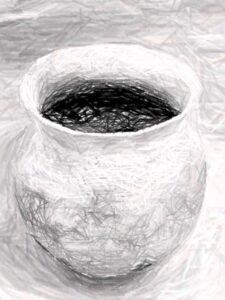A good friend put me on to a book by American Franciscan priest, writer, and spiritual director Richard Rohr entitled Falling Upward: A Spirituality for the Two Halves of Life. It’s an interesting read.
Rohr’s theological convictions suggest that we each have a divine spark that animates our lives and establishes purposeful blueprints for engagement with the world. Our journey of discovery proceeds in two stages. During the first stage, we build ego structures (“containers”) that provide our sense of self, our sense of place, a means to navigate our way in society, and a sure-footedness when following the disquieting path of growth. In the second stage, the focus shifts away from the container toward the contents they are meant to hold.
 Our containers are comprised of the laws, traditions, customs, boundaries, and moral codes that govern our societies. We assimilate them through our families, group affiliations, civil and religious authorities, and close associates. Healthy environments provide the right set of elders to guide our steps and the right limitations and freedoms to foster spiritual growth. A Rohr says:
Our containers are comprised of the laws, traditions, customs, boundaries, and moral codes that govern our societies. We assimilate them through our families, group affiliations, civil and religious authorities, and close associates. Healthy environments provide the right set of elders to guide our steps and the right limitations and freedoms to foster spiritual growth. A Rohr says:
“None of us can dialogue with others until we can calmly and confidently hold our own identity. None of us can know much about second-half-of-life spirituality as long as we are still trying to create the family, the parenting, the security, the order, the pride that we were not given in the first half.”
That being said, Rohr cautions against contexts that demand unquestioning followers by dominating leaders. We must wrestle with rules and authority to understand when and where they prove useful, and when and where to part company with them. We must also push beyond our comfort zones and leave the family nest (however defined) to find the “pearl of great price,” our true selves. Rohr characterizes this self as the indwelling Spirit that confers true enlightenment, discernment, and union between ourselves and everything else. It enables us to find a deep meaning in our everyday experience.
What are the tell-tale signs of those who have transitioned successfully into the second stage of life?
- They experience life as spacious and alive with possibilities. They contribute creatively and proactively to their communities because they forged strong containers in which to incubate and realize their visions.
- They are not compelled to protect, defend, prove, or assert their identities. They will accept the mantle of leadership but are not concerned with public affirmation or praise. They are content to simply be “part of the dance.”
- Their daily life reflects prayerful discernment. They do not get swept up in reactivity. They fight only that to which they are called directly and for which they have the requisite “equipment.” They withdraw energy from foolish or evil pursuits.
- When facing difference, they look for the “both-and” solution rather than be trapped in an “either-or” mentality.
- They accept pain and discomfort as a normal part of life and do not fixate on eliminating them. They let go of hurts and failures and lean into forgiveness instead of punishment for others’ transgressions.
- They influence others simply by being who they are.
Getting from the first to the second stage of life requires inner work. It calls for us to deconstruct the presentations of ourselves that reflect what others want from us, what garners worldly rewards, and what unduly shapes our identities. It takes a healthy dose of critical thinking – and perhaps an able guide or two – to recognize our “shadow selves” and see what lies beyond them. It’s humbling work but one that carries a big upside. When we recognize our shadow personas, they lose their power to control us. We stop giving away our inner gold to others.
Rohr laments that too many individuals and institutions get stuck in the first stage of life. They’re averse to the leaps of faith that attend to a life in continual growth and development. The familiar and habitual become falsely reassuring. As such, they build increasingly rigid containers and lose sight of the broader, deeper world in which their divinely-inspired souls might find a freedom of expression. They lose the capacity to give themselves away without strings in service to others. Rohr views Jesus as a second-half-of-life man embedded in a first-half-of-life culture. His radiant light provided a path to transcendence.
I understand what it means to be enmeshed in a cultural identity that “works” and the daunting task of unearthing a more authentic self. It takes faith and a measure of courage to stand apart from the cultural norms and chart a different course. The journey brings heartache and joy, confusion and certainty, loss and renewal. Though I’ve stumbled and fallen along the way, a firm foundation has enabled me to “fall upward” and not fall apart. I may never “arrive,” but I’m content to spend the rest of my life on the path.